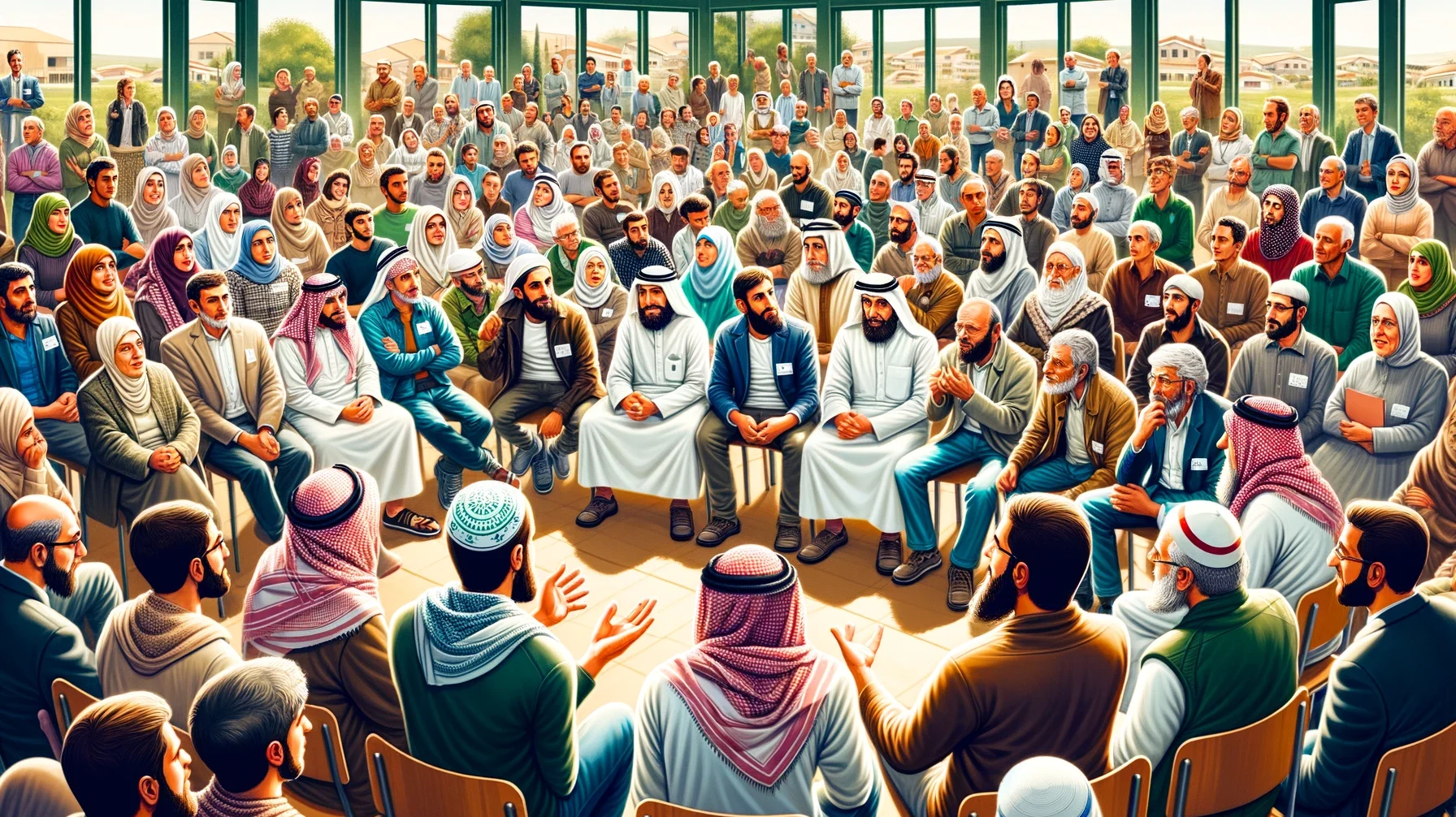Integration and Identity: The Dual Path of Arab Israelis
Arab citizens of Israel balance loyalty to the Palestinian cause with integration into Israeli society
When Yihya Sinwar launched his genocidal attack on October 7 under the name “Al-Aqsa Flood,” he aimed to ignite anger and passion in the Arab world, especially among Palestinians in Judea and Samaria and Arab citizens of Israel. The IDF’s large-scale intervention quelled reactions on the West Bank. But aside from isolated attacks from individuals, Israel’s Arab sector has been relatively subdued.
Hostilities in May 2021 led to riots by Arab Israelis, resulting in attacks on Jews, 12 synagogues and 112 Jewish homes set ablaze, looting, and 849 cars torched. At the time, alarm bells rang throughout Israel about the potential threat of further rioting and the long-term implications. It was seen as an Arab nationalist revolt against Israel. Thankfully, the hostilities ended after 11 days and a nervous quiet took over.
If the limited 2021 outbreak caused such mayhem, logically, the current war and devastation in Gaza should have sparked even more violence and protests from the Arab Israeli sector. After all, Arab Israelis, particularly the youth have been incessantly targeted by Hamas and Fatah through social media platforms such as TikTok and Telegram. The outbreaks of stabbing attacks and lone-wolf actions have been ongoing for years and are largely attributable to efforts to radicalize the youth.
70% of Arab Israeli respondents feel a part of Israel and its problems
The absence can be attributed to several factors:
That Hamas did not differentiate between Arabs and Jews on October 7 was a shock to many. Arab Israelis were among those slaughtered and kidnapped. Unlike their brethren in Judea and Samaria and throughout the Arab world, they were exposed to the full horror of the carnage committed by Hamas. A November and December 2023 poll by the Center for Democratic Values and Institutions revealed surprising findings. Around 70% of Arab Israeli respondents feel a part of Israel and its problems; 86% expressed support for assisting volunteering efforts during the war; 56% supported Mansour Abbas’ assertion that the events of October 7 do not reflect the values of Islam or Arab Israelis.
The Arabs in Israel still possess a strong affinity with the Palestinian cause. They also have a sense of appreciation that their standard of living and freedom in Israel is way better than across the Green Line and in Gaza. Accordingly, they seek to assimilate into Israeli society and benefit from the economic prosperity that is on offer while staying loyal to the Palestinian cause.
Contrary to claims that Israel is an apartheid state, Arab Israelis have equal rights and opportunities as full citizens. Is there racism, prejudice, and discrimination? Not in an institutionalized manner but there are tensions based on suspicion and mistrust. There are also gaps between the standard of living and services offered to the Arab sector and the rest of the country.
This holiday season, give to:
Truth and understanding
The Media Line's intrepid correspondents are in Israel, Gaza, Lebanon, Syria and Pakistan providing first-person reporting.
They all said they cover it.
We see it.
We report with just one agenda: the truth.


Three political movements support the Palestinian cause: the Northern Branch of the Islamic Movement, which is close to Hamas; the nationalist party Balad; and the Sons of the Village movement, which is aligned with the PFLP. These movements were active in inciting violence in 2021. Since then, they have adopted a more nuanced and calibrated approach that recognizes the economic and civic needs of the Arab sector and their reality vis-à-vis Israel.
The Arab parties that have represented their interests in the Knesset over the years have openly supported the Palestinian cause and been hostile to all governments. There have been regular attempts by right-wing parties to expel members of Arab parties in the Knesset who have overstepped the boundaries of what some deem to be acceptable behavior. The two most prominent cases were Hanin Zoabi of the Balad party and Ofer Cassif, who although Jewish is a member of the Hadash-Ta’al party, who barely survived a vote to expel him from the Knesset after he accused the Israeli government of genocide.
The willingness of Mansour Abbas’ United Arab List (Ra’am) party to join a government coalition in June 2021 marked a new paradigm. By backing the coalition government led by Naftali Bennet, he was able to trade his support for benefits for his constituency. This is despite his roots being in the Muslim Brotherhood.
While the Likud in opposition, together with the extreme right, depicted Ra’am’s participation as tantamount to betrayal and bringing in the fifth column, many Israelis viewed it as a positive step. (Benjamin Netanyahu likely would have made the same deal for Ra’am’s support, if he were able to do so.) The Arab sector comprises 20% of the population; if it can be motivated to display civic responsibility and in turn benefit, this can only improve the social cohesion and fabric of the country.
That Mansour Abbas condemned Hamas for October 7 was significant. Sadly, some members of Hadash and Balad, when questioned in the media, failed to do so. However, that a key figure like Abbas has not engaged in bashing the government has contributed somewhat to the quiet.
Arab engagement with Israel has increased, with a growing number proudly joining the IDF. Arab Israeli journalist Yoseph Haddad is one of Israel’s most effective public relations advocates. A study by the New Wave Institute found that 73% of Arab Israelis feel a sense of belonging to the state and prefer not to be governed by the Palestinian Authority. The same study, however, showed that 85% support the “right of return” for refugees, often interpreted as a call for an Arab majority in Israel.
Then there is the fear factor. The level of shock and trauma experienced on October 7 placed the entire country on full alert as signified by the mass call-up of all reservists. The country was on a war footing, particularly in the first four months of the war. The Arab sector likely kept a low profile, fearing reprisals, while observing the IDF’s efforts to suppress terrorism in Judea and Samaria. Moreover, Arab Israelis would have seen the destruction wrought in Gaza. This is brought out in another poll conducted by the Konrad Adenauer Program for Jewish-Arab Cooperation, which found that 69% of the Arab population feels that solidarity between Jews and Arabs has weakened since October 7. And 58.9% fear being harassed by Jewish Israelis.
Undoubtedly, the Arab sector desires an immediate cease-fire. Many have connections to Palestinians in Gaza and the West Bank. Except for some protests on university campuses, they appear to be taking a back seat in so far as we are now seeing demonstrations against the government and calls for a cease-fire from the general population who are frustrated by six months of war and no solution to freeing the remaining hostages.
The Arab sector is highly diverse. The Arab who lives in East Jerusalem is different from the Arab in Haifa, the Galilee, or the south. The situations pertaining to Druze, Bedouins, non-Bedouin Muslims, and Christians vary greatly, Issues such as crime and the disparity between services provided to Jews and Arabs also contribute.
Although only select poll findings are cited, reviewing all data reveals a complex landscape filled with nuances and contradictions that preclude definitive conclusions. It is clear, however, that the Arab sector cannot be ignored. Future governments must learn to engage constructively with the Arab sector. While the view of Palestinians in the territories has significantly influenced Israeli perceptions, caution is needed to prevent transferring this distrust and suspicion to Arabs living in Israel. Simultaneously, the ongoing efforts to radicalize Arab Israeli youth and the persistence of random terror acts cannot be ignored.
Recently, Ramadan and the call to “protect Al-Aqsa” have ignited tensions. This year, contrary to many fears, these tensions did not escalate. However, this should not lead to complacency. We know where that leads. A sophisticated strategy is needed that encourages Arab Israelis to seize national opportunities while remaining vigilant against radical influences.
Allowing figures like Bezalel Smotrich and Itamar Ben Gvir to label Arab Israelis broadly as “enemies of the state” risks a self-inflicted crisis. Moreover, it would be foolish to assume that the current calm reflects a major shift in Arab Israelis’ self-perception, their status in Israel, or their loyalties to the Palestinian cause.


